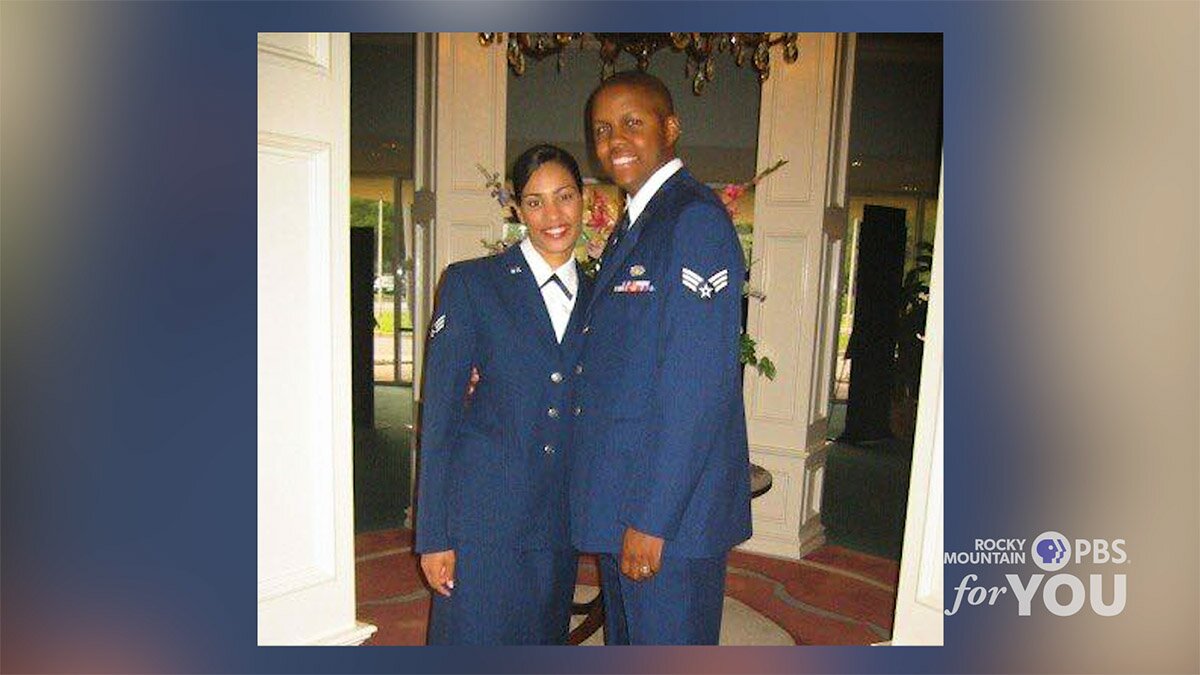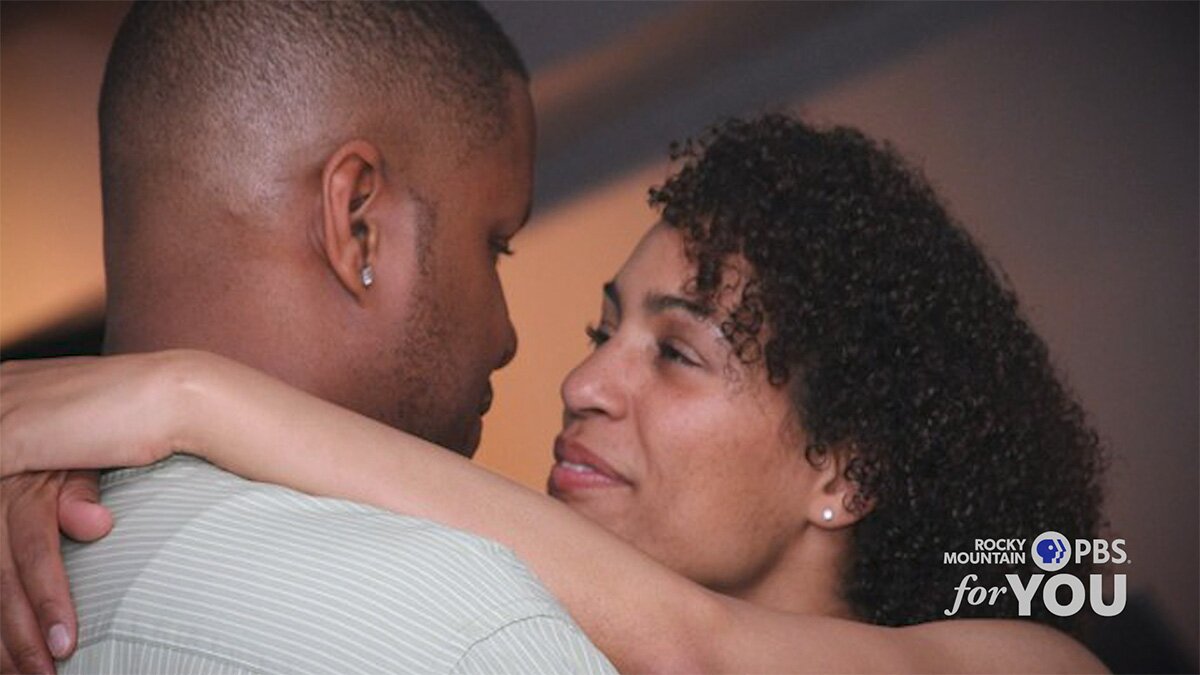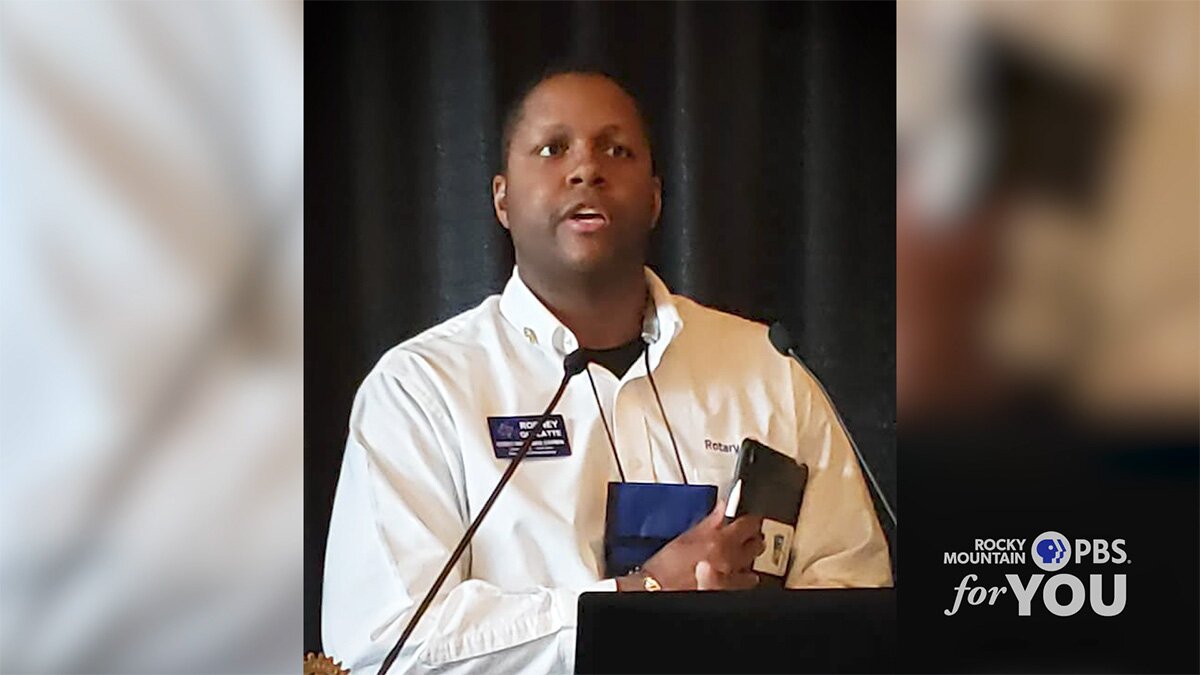Air Force veteran becomes first Black president of Rotary Club of Colorado Springs

The Rotary Club of Colorado Springs has elected the first Black president in its 104-year history: Air Force veteran, community advocate, husband, and father of three, Rodney Gullatte Jr.
A Certified Ethical Hacker with his own small business in the cyber security industry called Firma IT Solutions, Gullatte says, “Being creative and a cyber security engineer gives me an advantage, because I think outside the box.” Gullatte says his business is built on protecting companies from cyber attacks.
“We’re all familiar with hackers of the criminal element,” Gullatte says. “These are people that use computers to do all kinds of nefarious, crazy things. I know how to do all that, too. I studied all the same things. But I use my knowledge for good, not evil.”
Gullatte joined the Rotary Club of Colorado Springs in his first week of moving to the city.
“When I came to the Rotary four years ago, I was the only Black person there. If I had left because of that, I wouldn’t be president right now,” he says. “I’m the first Black president, and I’m very proud of that accomplishment.”
Gullatte was born in Marietta, Georgia, about twenty minutes north of Atlanta. There, he says, he had many opportunities to hone his creativity. He sang, danced, and played music as a child, performing with the Spelman College Children’s Dance Theatre.
Gullatte’s mother encouraged his curiosity about technology. He says she kept computers in the house growing up. He remembers playing Oregon Trail, Zork, and The Jungle Book on an Apple IIe. When his mom noticed he had a talent for computers, she got him a Compact Presario 954, under one condition: he had to read the MS-DOS 6.22, the user guide for the operating system.
“I read it, and started trying out different codes,” he says.
Gullatte also spent time integrating computers and musical instruments with Music Instrument Digital Interface, or MIDI. He learned how to sequence music, and how to layer tracks to create songs. He even competed in talent shows.
In 1990, at 10 years old, Gullatte befriended a neighborhood Office Max employee who answered all his questions about computer programming. A couple years later, in an early search on the internet, Gullatte researched salaries for computer programmers. “I already loved working with computers. And I liked those salaries,” Rodney said. “ At 12 years old, I decided that was going to be my career.”
Gullatte was inspired by his parents, both retired from the Air Force, who instilled in him a mindset of service.
“They wanted to make sure I knew that the blessings I have didn’t come for free,” Gullatte said. “Somebody had to sacrifice in order for me to have the advantages I have — especially when it comes to my ancestors. They made a lot of sacrifices, and a lot of people died, and endured terrorism here in the United States, just so I could be here right now.”
In 2001, Gullatte followed his parents' lead and enlisted in the Air Force. During his fifth week of basic training, a live radio feed announced that America was under attack.
“September 11 was an interesting day,” he says. “It was very dramatic.”

He remembers when the buses came to pick up his cohort from training. “They were kicking up dirt coming to get us, and skidding all over the place. We got our gear, we got in the bus, and we headed to Lackland Air Force Base.”
While driving, the radio feed reported the Twin Tower buildings had started to fall. “We were hearing it happen.”
Soon thereafter, Gullatte ended up in Saudi Arabia for the “Shock and Awe” campaign.
“We didn’t know what that was at first, or why we were going,” he said. “We knew we were going to be retaliating.”
There, Gullatte managed the world’s largest mobile power plant on the airfield where jets took off to bomb Baghdad. Working the night shift, Gullatte would watch the jets take off, their afterburners flying straight up into the air like a rocket, and disappearing into the clouds with a thunderous sound.
He was also in the Honor Guard in the Air Force.
“Once I got to serving in that capacity, it was very emotional. You had to be stoic, and show no emotion,” he says, remembering his first flag fold ceremony for a grieving widow. “You let your emotions out at the van after the event.”
“You can practice all you want,” Gullatte says, “but that first detail is something else.”
Gullatte’s parents met while in the Air Force, at Eglin Air Force Base at Fort Walton Beach, Florida. Gullatte also met his wife, Iris, in the Air Force — at the same base, no less — during his first permanent duty assignment.
In his three years of service, Gullatte reflects, “The best things I got out of the Air Force were my Honor Guard experience, my GI Bill, and my wife.”

Rodney and Iris married in June 2004. Two weeks later, on July 4, Iris left for an unaccompanied one-year tour to Korea.
Her most recent assignment — orders to NORAD — brought the family to Colorado Springs from Key West, Florida. Recently, Iris retired after twenty years in the Air Force.
“I’m excited about her being able to take a break,” Gullatte says. “I’ve been a military spouse, taking care of the kids while she’s been gone. Now we can be a family again — we don’t have to worry about deployments.”
“I’m proud that we were able to get through her whole military career still married,” Gullatte says. “For a lot of people who are in our situation, married couples in the military, the divorce rate is high. It’s tough when your significant other is away and you have to handle stuff. It’s challenging. And we made it through. So we get to celebrate that victory together.”
Coming to Colorado Springs from Key West, Rodney says he recalls lessons from his mother, Mary Gullatte, who “made sure I was well-versed and comfortable being in spaces where I am overwhelmingly outnumbered by people that don’t look like me. That’s a very unnerving situation to be in for a lot of people,” he says.
“If I find myself in a room full of white people, I know that’s the room I need to be in, because I’m about to have to be that bridge,” Gullatte says. “It’s tough being in that position, but if I don’t do it, who else is going to do it?”
Moving to Colorado Springs from Key West “was like night and day, let me tell you,” Gullatte remembers. He recalls being surprised by Colorado Springs’ treatment of minorities, non-cisgendered people, and women.
“The first week I got to Colorado, there was a news article about a gay couple who couldn’t get a cake made for their wedding, because the baker refused. And I said, ‘You all are dealing with that out here?’” he remembers. “If you were in Key West and did something like that, they would run you out of town. You don’t get to stay in Key West with an attitude like that. It’s very different.”

How women are regarded is also a “huge difference,” he says. Gullatte recalls a Colorado Springs business owner speaking in a circle of men during a networking event, and witnessing her disregarded and shut down by dismissive behavior. He says he was shocked. “The way they talked to her was like putting a hand in her face,” he says. “In 2020? Really? It’s crazy to me.”
“I am an agent to destroy any kind of social construct that oppresses women in any way, shape, or form,” Gullatte says. “I don’t have time for it. If I can stand up as a man and be a beacon to fight against that, I’m down for it.”
In Colorado Springs, Gullatte finds plenty of opportunities to shine his light. “I get to be a part of a cultural awakening with this Rotary Club,” he says.
Gullatte says he has found “his people” in the Rotary. “Their whole purpose is to make the world a better place,” he says. “They talk about the impact they want to make, and the mountains they want to move. Then they move them.”
Gullatte is also President of the Colorado Springs Black Business Network, and is aiming to create a Black Chamber of Commerce in Colorado Springs. “I’ve never started a Chamber,” he says. “It’s scary; I don’t have all the answers. But I don’t have to. Collectively, we have the answers.”
“One person can make an incredible amount of change. But if you can find a group of like-minded individuals to help you make that change, you can push that needle further and faster,” Gullatte says.
For Gullatte, “It’s all about how many people I can help,” he says. “Can I inspire other people to believe that they can make a huge, exponential impact on their community?”